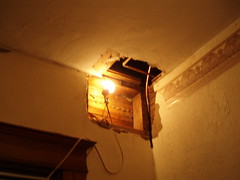 Drip, drip, drip goes the faucet … and money just continually moves from your back pocket right into the coffers at the utility department. It’s no secret that simple plumbing repairs like stopping those drips saves you money, but often people have no idea how much.
Drip, drip, drip goes the faucet … and money just continually moves from your back pocket right into the coffers at the utility department. It’s no secret that simple plumbing repairs like stopping those drips saves you money, but often people have no idea how much.
Read More→

Archive for plumbing leaks
You hear water running in your home but just can’t find it. You know it’s not in your head. Perhaps you have had an unusually high water bill or maybe your entire house is full of water. NE Dallas, it’s time to call your plumber!
The process of locating a slab leak is a complicated one, requiring expensive and highly specialized equipment. The knowledge and skills required to use this type of gear doesn’t come in a bag along with rented equipment.
There’s generally a three-step process for slab leak location. Assuming there is a leak that has been isolated to the inside of the home and no evidence of a leak can be found above ground, it is time to locate the leak underground.
- Locate the pipe. We electronically locate the pipe and mark the ground with masking tape so we know exactly where the pipe is located underground and roughly how deep it is.
- Listen along the length of the pipe with geophones. We use a geodesic headset which is a very powerful stethoscope with a separate microphone for each ear so that we can listen directionally.
- Measure the temperature of the floor along the length of the pipe to find the hot spot.
This applies only to hot water slab leaks.
These steps come as second nature to any of our plumbers. Those without the skills and training to use this type of equipment, along with a full understanding of the processes involved, should not be allowed to start breaking into the slab. Our plumbers undergo continuing education, it’s an advantage you have with us over a handyman or less-qualified company. We’ll take care to detect and repair your leak while we respect your property.
Give us a call immediately at (972) 424-6479 to have one of our licensed, qualified plumbers come out to determine your next course of action.
Best Practices: Stop a Plumbing Leak Now
Take precautions when you notice that turning a handle won’t cause water to completely stop. Plumbing leaks will only get worse over time. If a faucet washer is already worn out, applying more force can actually do more harm than good. You don’t want to strip the threads. If you do go that far, turn off the water under the sink at the source so that your faucet will stop running.
 It’s a good domestic practice to regularly go around your house and make a mental note of the state of your faucets. Don’t forget the faucets that exist behind your washer and under the kitchen sink, connecting the dishwasher and refrigerator to the main water line.
It’s a good domestic practice to regularly go around your house and make a mental note of the state of your faucets. Don’t forget the faucets that exist behind your washer and under the kitchen sink, connecting the dishwasher and refrigerator to the main water line.
Next, take a good look around the outside of your home. Outside hosebibs are easy to overlook, and during the colder months, even more susceptible to unnoticed problems. Be sure to disconnect your hose before a freeze. Outside hosebibs that freeze usually do not cause any trouble until they start to thaw. You may notice a wet spot on your carpet in the closet for instance.
Another thing to quickly take notice of is the ceiling of a two or more story building. If water is leaking somewhere overhead, you need to know about it before it gets out of control. Pay attention to the flooring around toilets, dishwasher and washing machine. If there is cracked and blistered paint, or water-damaged material, it could be a leak that is intermittent, happening only when a certain fixture is used, but not constantly. Those situations still need to be corrected immediately to salvage the remaining building materials and keep serious rot and mold from happening.
Tell us your plumbing leak discoveries. Everyone has some sort of disaster they can remember – share yours here!
Photo Credit: jmgold on Flickr through a Creative Commons License
Subscribe
You Can Find us HERE, too!
Topics
- Appliance Installation
- Community Incentives
- Drain Lines
- Environment
- Faucets
- From the Heart
- Gas Cooktop Installation
- Gas Leaks
- Gas Service
- Getting Ready for Spring
- Home Improvement
- Home Safety
- Just For Fun
- Plumbing Leak
- Plumbing Repair
- Spending Wisely
- Tankless Hot Water Heaters
- Toilet Repair
- Troubleshooter
- Uncategorized
- Water Heater Repair / Installation
- Water Purification
Copyright © 2024 All Rights Reserved
Customized by Zero To Sixty Marketing LLC

Recent Comments